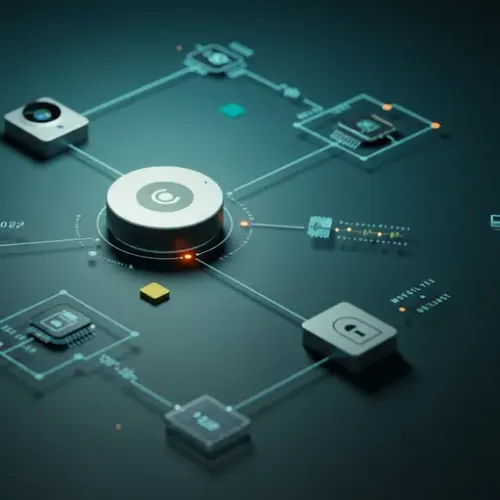Mastering IP Video Doorbell Integration: Two-Way Audio, Unlock, & Event-Driven Automations with Home Assistant

NGC 224
DIY Smart Home Creator
3m read
Many smart home enthusiasts invest in video doorbells, but most cloud-dependent options limit local control and raise privacy concerns. Integrating an IP-based video doorbell directly into Home Assistant provides ultimate control, enabling two-way audio, remote door unlocking, and complex automations—all managed locally. This guide covers setting up video, SIP audio, event capture, and secure door access, creating a robust, private, and customizable security solution for your smart home.
1. Prerequisites & Network Configuration
First, assign a static IP address to your doorbell. Find its RTSP stream URL (e.g.,rtsp://user:[email protected]:554/stream1) and any SIP credentials. Consider a dedicated IoT VLAN for security.
2. Integrating RTSP Stream for Live Video
Add your doorbell's RTSP stream toconfiguration.yaml using the generic camera integration:
camera:
- platform: generic
name: Front Doorbell Camera
stream_source: rtsp://user:[email protected]:554/stream1
still_image_url: http://192.168.1.100/snapshot.jpg # Optional
camera.front_doorbell_camera entity provides a live feed for Lovelace.
Screenshot Placeholder: Lovelace card showing live doorbell video.
3. Enabling Two-Way Audio with SIP & go2rtc
go2rtc (HA Add-on or Docker) is excellent for two-way audio. Configure its sip section in go2rtc.yaml to register with your doorbell's SIP server or an external one.
sip:
local_addr: 192.168.1.50 # HA/go2rtc IP
listen: :5060
auth:
- name: ha_sip_user
pass: ha_sip_pass
# register: sip:doorbell_user:[email protected]:5060
SIP card in Lovelace for interactive video calls.
type: custom:sip-card
server: ws://192.168.1.50:8555/ws
video:
url: 'rtsp://192.168.1.50:8555/doorbell'
Screenshot Placeholder: Lovelace SIP card for two-way audio and video.
4. Capturing Doorbell Button Events
Methods vary by doorbell. Choose based on your device's capabilities.- MQTT: (Recommended if supported)
mqtt: binary_sensor: - name: "Front Doorbell Button" state_topic: "doorbell/front/button" payload_on: "pressed" device_class: "occupancy" - RESTful Sensor: (If doorbell has an API)
sensor: - platform: rest name: "Doorbell Status" resource: http://192.168.1.100/api/status value_template: "{{ value_json.button_pressed }}" scan_interval: 5
5. Remote Door Unlocking (Securely)
Control an electric strike via arest_command in configuration.yaml targeting a local relay (e.g., ESPHome).
rest_command:
door_unlock_front:
url: "http://192.168.1.200/relay/0?action=open" # ESPHome example
method: POST
headers: {Authorization: "Bearer YOUR_API_KEY"} # Security critical
input_button in Lovelace. Security Warning: Use strong authentication and network isolation for such critical actions.
Troubleshooting Section
- Video: Check RTSP URL, credentials, IP. Test in VLC. HA logs.
- Audio:
go2rtcSIP registration, credentials, firewall for SIP/RTP ports. - Events: MQTT Explorer for topics,
curlfor REST API. HA automation traces. - Unlock: Test
rest_commandwithcurl. Verify relay. HA logs.
Advanced Configuration / Optimization
- Intelligent Filtering: Use template binary sensors to combine/filter motion and button events for smarter triggers.
binary_sensor: - platform: template sensors: visitor_alert: value_template: > {{ is_state('binary_sensor.button', 'on') and (now() - states.binary_sensor.motion.last_changed).total_seconds() < 30 }} - Dynamic Notifications: Send snapshots with mobile notifications.
# Automation action action: - service: camera.snapshot data: {entity_id: camera.front_doorbell_camera, filename: "/config/www/visitor.jpg"} - delay: "00:00:01" - service: notify.mobile_app_your_phone data: {message: "Visitor!", data: {image: "/local/visitor.jpg"}}
Real-World Example: Enhanced Front Door Security & Access
# automations.yaml
- alias: "Doorbell Press - Announce & Notify"
trigger: {platform: state, entity_id: binary_sensor.front_doorbell_button, to: "on"}
condition: "{{ is_state('input_boolean.doorbell_dnd', 'off') }}"
action:
- service: tts.google_translate_say
data: {entity_id: media_player.google_home_mini, message: "Visitor at front door."}
- service: camera.snapshot
data: {entity_id: camera.front_doorbell_camera, filename: "/config/www/visitor.jpg"}
- delay: "00:00:01"
- service: notify.mobile_app_all_devices
data: {message: "Visitor!", data: {image: "/local/visitor.jpg", clickAction: "/lovelace/doorbell-view"}}
- alias: "Lovelace Button - Unlock Gate"
trigger: {platform: state, entity_id: input_button.unlock_gate, to: "on"}
action:
- service: rest_command.gate_unlock
- service: persistent_notification.create
data: {title: "Access Control", message: "Gate unlocked."}
Best Practices / Wrap-up
- Security: Strong passwords, IoT VLAN, disable cloud services, cautious port exposure.
- Performance: Optimize video bitrate, minimize REST polling.
- Reliability: Dedicated SIP server (if needed), persistent volumes, log monitoring.
- Backup: Regular HA config backups, document doorbell settings.

Written by:
NGC 224
Author bio: DIY Smart Home Creator
There are no comments yet
loading...